
In a review published in the journal of UroPrecision, researchers from the University of Texas McGovern Medical School reveal how artificial intelligence (AI) is setting a new course in men’s sexual health, specifically in the diagnosis and treatment of erectile dysfunction (ED).
This comprehensive review, led by Run Wang and Darren Sanchez from The University of Texas McGovern Medical School and MD Anderson Cancer Center, Houston, U.S.,, delineates AI’s transformative potential in addressing a condition affecting up to 150 million men globally.
Erectile dysfunction, a prevalent issue among men, has been traditionally managed through clinical assessments and pharmaceutical interventions. Recent advancements in AI and machine learning (ML) are reshaping the diagnostic and therapeutic landscape of ED. The study emphasizes AI’s role in enhancing diagnostic accuracy, personalizing treatment plans, and improving surgical outcomes through augmented reality and virtual health assistants.
AI applications in ED range from virtual health assistance safeguarding patient privacy to augmented reality aiding surgeons in real-time. Moreover, AI-driven platforms can foster patient engagement and provide targeted treatment plans. For instance, AI’s capability to sift through genetic, lifestyle, and psychological data can craft individualized treatment pathways, offering alternatives when standard medications fail due to side effects.
Run Wang, one of the correspondence authors of this review, underscores the significance of this shift, “AI’s integration into men’s health ushers in a personalized medicine era, where diagnostics, treatment, and patient care are tailored to individual needs. Its capacity to analyze vast datasets can lead to more nuanced understanding and management of ED.”
The implications of AI in ED management are profound. Beyond enhancing diagnostic precision and treatment efficacy, AI’s predictive models can significantly reduce health care costs and increase accessibility. However, ethical and practical considerations, including data privacy and the potential for over-reliance on technology, remain paramount challenges that need addressing.
More information:
Darren Sanchez et al, Shaping the future of men’s sexual health: How artificial intelligence can assist in the management and treatment of erectile dysfunction, UroPrecision (2024). DOI: 10.1002/uro2.31
Provided by
Higher Education Press
Citation:
Improving men’s sexual health: AI’s pivotal role in erectile dysfunction management (2024, April 25)
men-sexual-health-ai-pivotal.html
.
. The content is provided for information purposes only.
